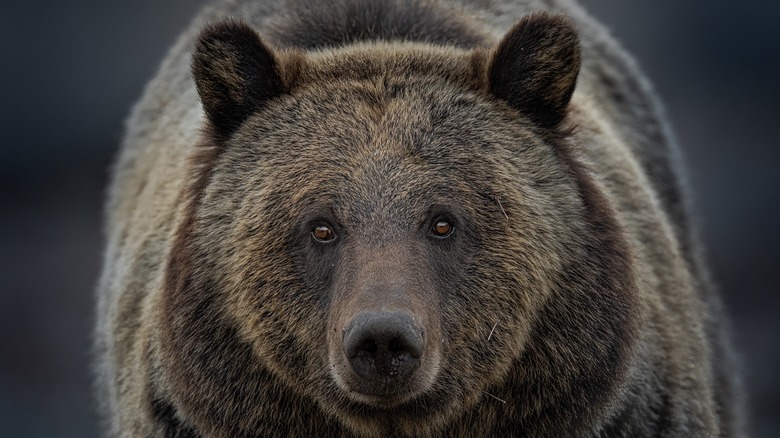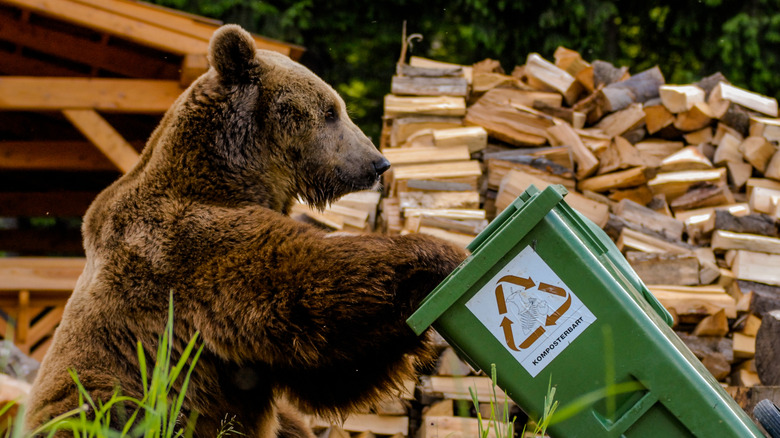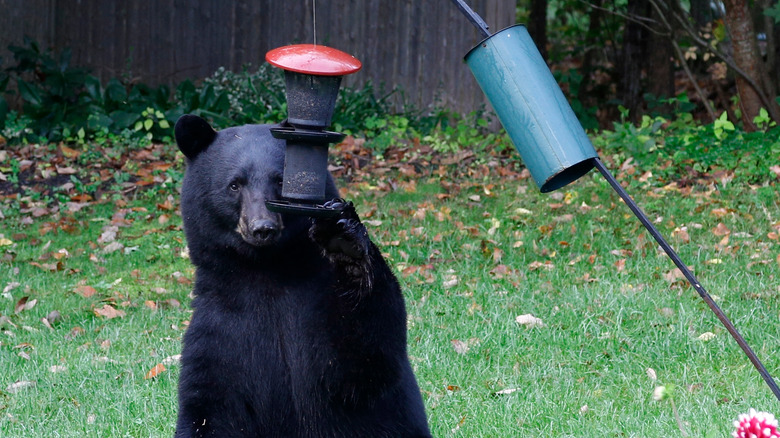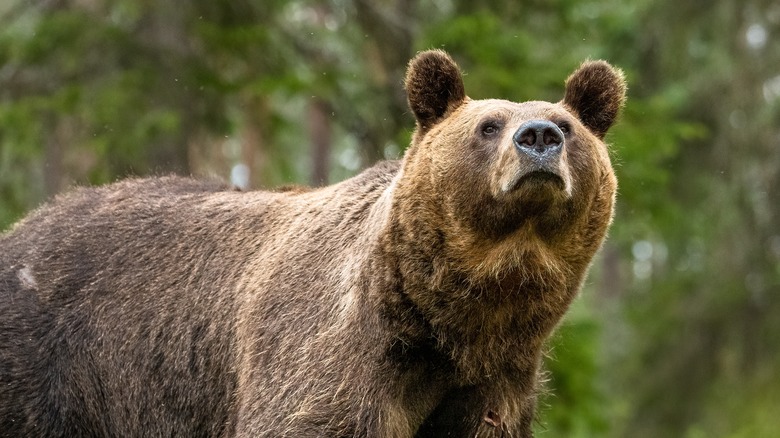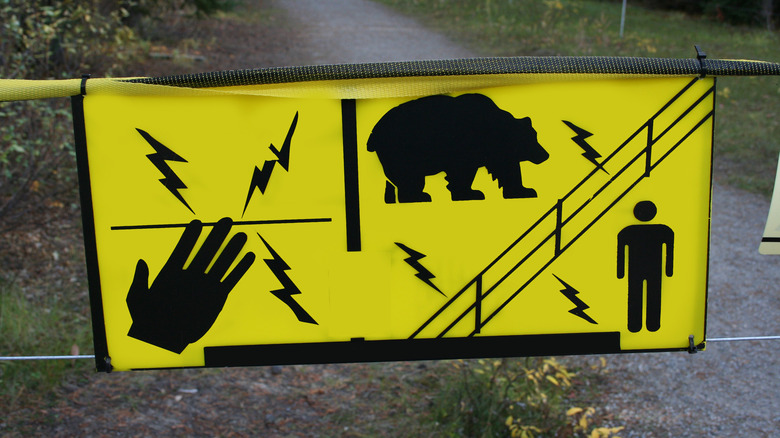5 Ways To Keep Bears Away From Your Yard
The good news is that the black bear population is rising in many areas of North America; the bad news is that human and bear interactions are increasing (via Predator Guard). And while grizzly bears mostly live in areas where there are few people, it's still important to do your research in order to find out how you can lower your chances of encountering these adorable, yet large and dangerous animals.
Keeping bears away from your property isn't only safer for you, but it's also better for the bears. Learning to eat human food and rely on human environments to feed themselves makes bears less wild and less able to fend for themselves when humans aren't there to provide the grub (via KOAA News 5). It's also dangerous for them if the encounter turns sour and they hurt someone. Most of the time, according to The Washington Post, these cases result in the bear being killed even if it isn't their fault.
Don't make food accessible
Picnics and grill-outs are a fantastic way to enjoy the great outdoors. However, in bear country, you'll need to take extra steps to ensure you aren't accidentally inviting another large and fussy guest. Just as Winnie the Pooh would do anything to score some honey, real bears also go to great lengths to get to the delicious food around your home.
Oftentimes, it's the smell of food that brings them into your yard before the curiosity of what might be inside a closed container gets them into trouble. As such, Predator Guard says to keep the grill or smoker outside your home as clean and free of food material as possible and to consider moving it into the garage when it's not in use.
Even things in your car can entice a bear onto your property, according to KOAA News 5. Between 2019 and 2020, bears broke into vehicles in Colorado 484 times (via Backpacker). Thus, keep trash, food items, air fresheners, and cosmetics out of your car whenever you can. Not only can this prevent an expensive encounter, but it could also keep a bear from becoming trapped inside the vehicle.
Lock up and conceal trash
The smell of garbage makes most of us want to cover our noses and run. However, bears smell the promising scent of food in the most rancid of trash bags. As such, it's not surprising that unsecured trash is one of the most common reasons why a massive grizzly might venture onto your property (per The Humane Society).
To prevent this, make garbage and recycling inaccessible. You can do this by either keeping your trash in a sturdy and locked garage or shed, or by investing in a bear-proof trash bin. Either way, keeping your waste out of sight and smell is imperative. Bears can smell things from over a mile away and will make the hike to find out what it is (via National Park Service), so you can never be too careful.
Speaking of stuff that smells gross to us but appealing to them, if you have a compost pile you'll want to keep it enclosed or take action to reduce the smell. It's also recommended by WikiHow to move your compost pile to the back of your yard or property. This way, if a bear is attracted to it, it will at least be further away from your home. Unfortunately, this only works if you have a large property.
Secure pet food and bird feed
Many people have pets, whether they be dogs, cats, birds, or reptiles. Unfortunately, all of these animals have aspects of ownership that lead to smells that attract bears. For example, some feed their dogs or cats outside. However, kibble is yummy for your pets as well as bears!
To protect your pets and yard from these large mammals, lock up pet food in the garage or house (via KOAA News 5). Additionally, if you feed your pet outdoors, give them time to eat and then clean it up. Do not leave pet food outside unattended.
Don't have pets? Predator Guard says bears love bird feeders as well and have been known to climb trees to reach them in order to snack on the seeds. Throwing out your DIY bird feeder might break your heart, so switch to winter feeding instead. Bears will be hibernating at this time of the year and won't bother the feeder. This is also when birds need feeders the most.
Strong scents will work
As mentioned earlier, bears have an incredible sense of smell and can detect food from over a mile away. Of course, concealing these smells is a great deterrent, but if it can't be helped, try using their superior sense of smell against them.
Colorado Parks and Wildlife says that pungent, unpleasant odors can work great at keeping bears away from your home. For example, you may hate the smell of bleach when cleaning your bathroom, but bears will hate it even more due to their highly sensitive noses. Thus, spraying ammonia or bleach on and around trash areas is a fantastic deterrent.
A word of caution: It's essential not to use irresponsible "homemade deterrents" that some sites suggest. For example, some say to use a balloon with ammonia and cover it with honey so that a bear will seriously regret messing with it. Doing this can seriously harm or even blind animals. So while it's important to deter aggressive critters from your property, it's also vital to ensure you aren't harming wildlife.
Use effective nonlethal methods
Bears are cute and fluffy, so it might be hard to use deterrents that seem too unpleasant. Alternatives like flashing lights and noise deterrents are popular among those who want to avoid harsher methods for keeping bears away. Unfortunately, Colorado Parks and Wildlife says most wildlife will learn that flashing lights and noise deterrents are just that and will ignore them.
One less harsh method that works wonders is unwelcome mats, which can be purchased or made using DIY methods and are great at keeping bears from entering a home through a door or window. According to the Virginia Department of Wildlife Resources, unwelcome mats use plywood and nails that cause pain (but no lasting damage) to bears when made correctly. Since these are cheap and effective, many people use them at vacation homes when they are gone for long periods.
By setting up an electric fence, you can keep bears away from beehives, fruit trees, gardens, and chicken pens. If they are legal within your area, electric fences are incredibly effective at dishing out non-lethal punishment for animals who don't belong on your property.
